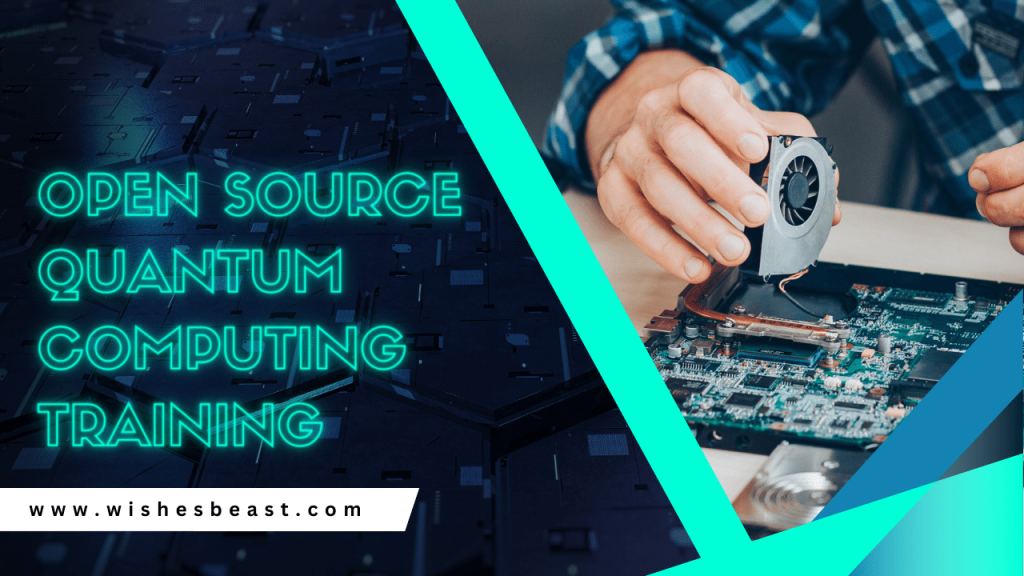Open Source Quantum Computing Training (2024)

Introduction Quantum computing represents the future of technological advancements, promising radical changes in how we compute. If you’re seeking to dive into this field, open source training can be your best ally. Discover the realms of quantum programming education through open source quantum computing training. Let’s explore!
1. What are the Best Open Source Resources for Learning Quantum Computing?
The world of quantum programming education is vast, but open source stands out, empowering learners with flexibility and a hands-on approach. Some top platforms for quantum technology courses include Qiskit by IBM and Microsoft’s Quantum Development Kit.
2. How to Get Started with Open Source Quantum Programming?

Dive into quantum computing tutorials to familiarize yourself with the basics. Platforms like Quantum Open Source Foundation offer a comprehensive quantum computing curriculum and a range of quantum simulator learning tools.
3. Are there any Online Courses for Open Source Quantum Computing?
Absolutely! There’s a surge in quantum education platforms that offer courses in quantum computing fundamentals. Websites like Coursera and edX host courses in collaboration with top universities, covering quantum software development and more.
4. Are there Free Tutorials for Quantum Programming and Simulations?
Open source quantum software communities often provide quantum computing tutorials and quantum coding workshops. Look for GitHub quantum software repositories or join the quantum computing community for insights.
5. What Programming Languages are Commonly Used in Open Source Quantum Development?
Languages such as Python, C++, and Q# are popular in quantum software development. These languages offer extensive libraries and tools for quantum programming.
6. How Can I Contribute to Open Source Quantum Computing Projects?

Join quantum coding challenges or scour platforms like GitHub for quantum computing projects. By contributing, you not only learn but also enhance your portfolio.
7. Can you Recommend a Roadmap for Self-Studying Open Source Quantum Computing?
Start with quantum computing fundamentals and delve deeper into quantum algorithm training. Engage in quantum simulator learning, participate in quantum coding workshops, and tackle real-world quantum computing projects.
8. Are there any Online Platforms that Offer Interactive Quantum Coding Challenges?
Platforms like Quantum Computing Playground and Quantum Katas offer interactive quantum coding challenges, enhancing your skills as you solve real-world problems.
9. How do I Set Up a Development Environment for Open Source Quantum Programming?

Leverage quantum development resources available on platforms like Qiskit. They provide comprehensive guides to help you set up and dive into quantum software development.
10. What are the Advantages of Open Source Quantum Computing compared to Proprietary Solutions?
Open source quantum solutions encourage collaborative growth, fostering a strong quantum computing community. They provide transparency, allow customization, and eliminate restrictive licensing.
11. Are there any Workshops or Webinars on Open Source Quantum Software?
Certainly! With the rise of the quantum computing community, numerous institutions and organizations frequently conduct quantum coding workshops and webinars. They provide hands-on training, allowing you to engage with experts, clarify doubts, and network with like-minded individuals. Platforms like Eventbrite or even university websites regularly list such events.
12. What are Some Recommended Textbooks for Learning about Open Source Quantum Computing?
For those who prefer traditional learning methods, there are an array of textbooks available. Titles like “Quantum Computing for Computer Scientists” and “Quantum Algorithms via Linear Algebra” offer in-depth insights. Moreover, many open source platforms recommend readings, ensuring you get knowledge from the most trusted sources in quantum programming education.
13. Are there any Online Communities for Discussing Open Source Quantum Coding?
Absolutely. The quantum computing community is vibrant and welcoming. Forums like Quantum Computing Stack Exchange, subreddits like r/QuantumComputing, and Discord channels dedicated to quantum programming are hubs of discussions, problem-solving, and knowledge-sharing. These communities foster collaboration and provide continuous learning opportunities.
14. What are Some Real-world Applications of Open Source Quantum Computing?
Open source quantum computing has the potential to revolutionize industries. From optimizing financial models to drug discovery, and from efficient energy storage solutions to tackling complex logistical problems – the possibilities are vast. Moreover, being open source, these solutions ensure transparency, adaptability, and extensive community support.
15. Are there any Online Platforms that Offer Quantum Education Platforms?
Beyond tutorials and courses, quantum education platforms such as Brilliant and FutureLearn offer extensive modules on quantum mechanics, algorithms, and programming. These platforms break down complex topics into easily digestible chunks, making learning quantum concepts a breeze.
16. What is the Importance of Quantum Hardware Training in Open Source Quantum Computing?
While software is crucial, understanding quantum hardware is equally vital. Quantum hardware training provides insights into quantum bits (qubits), superposition, entanglement, and quantum gates. With the availability of open source quantum hardware designs and simulation tools, learners can get a tangible feel of how quantum computers function at a fundamental level.
17. Are there any Challenges Unique to Open Source Quantum Computing?
While open source offers numerous advantages, it also comes with challenges. Keeping up with rapidly evolving technology, ensuring compatibility across various quantum hardware platforms, and addressing potential security vulnerabilities are some issues faced by the open quantum systems training community. However, the collaborative nature of open source often means that solutions are quickly devised and implemented.
18. How Do Quantum Software Repositories Facilitate Learning?
Quantum software repositories like those on GitHub are gold mines of learning. They not only provide access to a plethora of quantum software projects but also allow you to observe, modify, and even contribute to existing codes. By analyzing and participating in real-world projects, learners can rapidly enhance their skills and understanding.
Frequently Asked Questions
Are there any certification programs for open source quantum computing skills?
Yes, institutions and platforms like edX and Coursera offer certifications in collaboration with top universities.
What are the current trends in open source quantum computing education?
The integration of AI with quantum computing, real-world quantum applications, and hybrid quantum-classical systems are trending topics.
Where can I find open source quantum simulators to practice with?
Quantum Open Source Foundation, Qiskit, and Microsoft’s Quantum Development Kit offer robust quantum simulators.
Are there any grants or funding opportunities for open source quantum software development?
Institutions like the National Science Foundation periodically offer grants for quantum research and development.
Also Read: How Could Quantum Computing Benefit the Financial Services Industry?
Conclusion
Open source quantum computing training is the key to unlocking vast opportunities in the realm of quantum technology. By leveraging the resources, tools, and community support available, anyone can venture into this exciting field. Remember, the quantum realm awaits the curious, the passionate, and the daring. Dive in!


